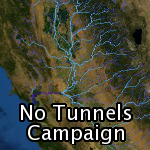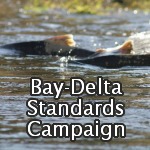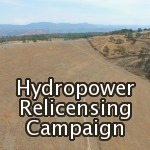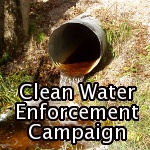On November 30, CSPA filed testimony and exhibits for the State Water Board’s hearings on the Delta Tunnels (“WaterFix”). This new testimony is for Part 2 of the hearings: impacts to fish and wildlife, recreation, and other Public Trust values. Some of the highlights are described below.
CSPA’s biologist Tom Cannon presents thirty pages of testimony on how the state and federal water projects affect fish today and how they would affect fish with the tunnels in place. He supports his testimony with 60 exhibits. Tom describes the conditions that Delta and Central Valley fish need to recover. The tweaks that WaterFix proponents propose to make to existing inadequate protections for fish aren’t even close.
CSPA’s Executive Director Bill Jennings describes what happened to fish and water quality over the last 50 years and the failure to establish enforceable measures to protect them. He discusses the collapse of Central Valley fisheries and the history of disastrous decisions by the State Water Board and the fish agencies during this collapse. The Board must define and implement a methodology to balance the public trust with other uses of water, using information it already has gathered to set the flows necessary to restore Delta fisheries.
CSPA’s advocate Chris Shutes reviews the recommendations that the fish agencies made in the Delta flow criteria proceeding in 2010. Since the fish agencies aren’t showing up in the WaterFix hearings, the State Water Board should give great weight to what those agencies said when they did. The Board needs require carryover storage numbers for Trinity, Shasta, Oroville and Folsom reservoirs, so that adequate Delta flows don’t take water away from fish upstream.
Longtime advisor to CSPA Dr. G. Fred Lee discusses how the new WaterFix diversion will reduce the amount of Sacramento River water entering the Central Delta through Turner Cut. This change will reduce the dilution of San Joaquin River water in the Central Delta and thereby adversely impact fisheries, recreation, and aesthetic aspects of water quality in the Central Delta.
Marc Del Piero, former “attorney member” of the State Water Board, relates how earlier Boards established a “formula” in water rights proceedings in order to protect public trust resources. The current Board has departed from that formula. He calls WaterFix a “‘bait and switch’ scheme that results in innocent residential customers being unknowingly compelled to pay for and subsidize the infrastructure expenses of future private developers.”
Felix Smith, former U.S. Fish & Wildlife Service biologist and whistle-blower, recalls the history of the public trust doctrine as it has applied to California water law. He concludes “Trustee agencies have an affirmative duty to manage public trust assets.” This means that the Water Board can and should impose conditions on the state and federal projects that relate not only to proposed project additions, but to existing facilities and operations.
Jerry Neuburger, past and present chair of Delta Fly Fishers, provides a personal fifty-year history of striped bass fishing in the Delta. The great fishery of his youth led to a lifelong investment in experience, boats and equipment. In 2006, Jerry took up guiding, even though the fishery was clearly in decline. Jerry tells the story of how over the last few years, much of the striper fishery and the businesses that supported it have faded into the Delta sunset.
Dan Bacher is editor of the Fish Sniffer magazine, a bait shop staple for countless anglers. Dan paints the picture of the decline of stores that carried his publication and that advertised in it. Another angler with thousands of days fishing the Delta and it tributaries, Dan describes the fishing opportunities whose loss coincided with increased Delta exports. The testimony includes a personal account of advocacy for protection of winter-run salmon.
Dan Hurley is a fourth generation member of a family in Stockton that fished the Delta commercially until 1958. Dan has written over 2000 fishing reports since 2005. In addition to his own list of lost businesses, Dan talks about how fish guiding in the Delta has become marginal or simply unsustainable. Most fish are gone. Almost all the big fish are gone. Many of the great spots of the past are buried under water hyacinth.
Dave Fries, former professor of medicinal chemistry and longtime advisor to CSPA, has sailed sailed the Delta in a sailboat over decades. He has seen worsening of water quality and wildlife habitat. In particular, Dave speaks of the toxic algae blooms and weed-choked waterways during the 2015 drought. If WaterFix goes forward, construction impacts from barges and dredges will limit boating opportunities, and large areas of wetlands will be filled with tunnel muck.
Tom Stokely, longtime Trinity River advocate, speaks of the effects on both rivers of moving Trinity River water into the Sacramento River. He also talks of how using Trinity River water to irrigate the western San Joaquin Valley leaches selenium out of the ground and into the San Joaquin River and the Delta.
In addition to CSPA witnesses and exhibits, CSPA’s partners AquAlliance and the California Water Impact Network (C-WIN) submitted testimony, and some of their witnesses will appear in the hearing in panels with CSPA witnesses. AquAlliance’s witnesses include Kit Custis (hydrogeologist speaking of groundwater effects of Delta tunnels), Barbara Vlamis (also testifying on groundwater), Jim Brobeck (speaking of Chico groundwater loss), Dr. Don Hankins (looking at the Delta and the proposed tunnels from the perspective of the Mikwo culture) and Trina Cunningham (speaking of the Maidu view of the Feather River and points downstream). C-WIN’s witnesses are economist Dr. Ed Whitelaw (testifying on how to balance the public trust), and Arne Sjovold and Aaron Budgor (joint testimony on both Delta hydrology and how the Santa Barbara extension of the State Water Project was high cost and low benefit).
Up till now, CSPA has had no financial resources to pay its witnesses. We now enter weeks of hearings that require careful attention, after which CSPA will need to develop further testimony to rebut tunnel proponents. We know we can never compete with the water contractors economically. But in this David and Goliath battle, we can, must, and do hold our own. CSPA desperately needs your check to help us remain effective. Please make a generous end-of-year contribution to CSPA today.
CSPA Delta Tunnels Part 2 Testimony Library Below









